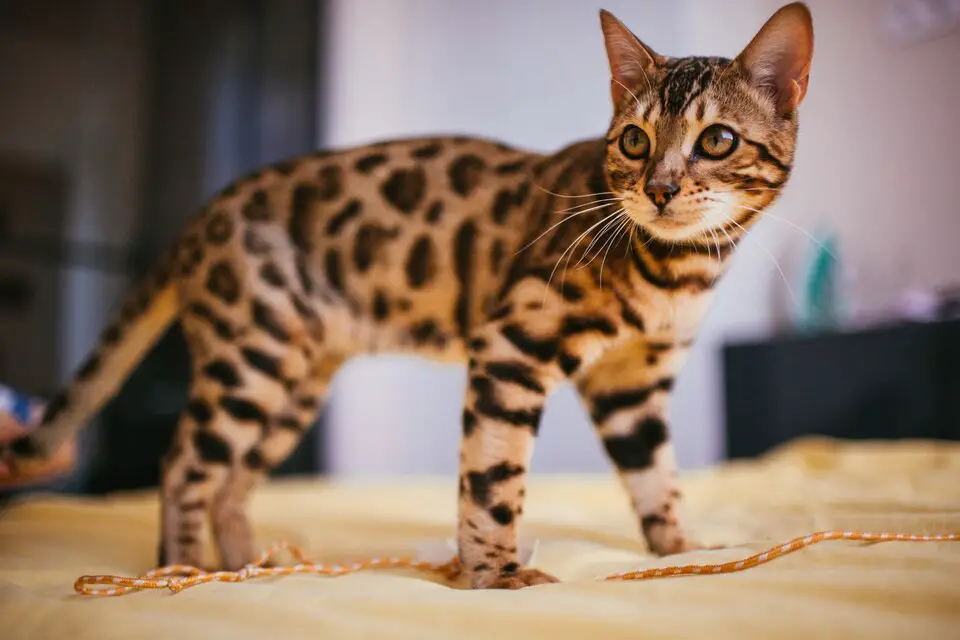Bengal cats are a breed like no other, captivating with their striking appearance and renowned for their boundless energy. As cat enthusiasts and Bengal cat owners know, understanding their unique traits is essential for providing the best care. One critical aspect of their lives is their sleep patterns.
We will explore the charming world of Bengal cats’ sleep, shedding light on how long these active felines rest and what factors influence their slumber whether you’re a Bengal cat owner or simply intrigued by these magnificent creatures, read on to discover their sleep secrets.
Bengal Cats: A Unique Breed
Bengal cats are a distinct and captivating breed known for their striking appearance and lively personalities. Originating from the crossbreeding of Asian leopard cats with domestic cats, Bengal cats exhibit distinctive coat patterns resembling those of their wild ancestors. Their energetic and playful nature often sets them apart from other domestic felines. Bengal cats have a natural curiosity and a love for interactive play, making them popular among cat enthusiasts.
The Average Cat’s Sleep Patterns
Cats are renowned for their ability to doze off at a moment’s notice in feline sleep patterns. On average, a typical cat sleeps for approximately 12 to 16 hours a day, with some variations depending on factors like age, health, and individual temperament. These furry companions are classified as crepuscular animals, meaning they are most energetic during dawn and dusk. This crepuscular behavior is thought to be an adaptation that aligns with their hunting instincts, mirroring the activity of their natural prey.
Bengal Cats’ Sleep Patterns
Despite their wild appearance, Bengal cats share the same fundamental sleep patterns as domestic cats. However, their sleep requirements may fluctuate based on age and activity levels. While adult Bengal cats may sleep for around 12 to 16 hours a day, kittens tend to log even more hours in dreamland, sometimes up to 20 hours daily. Bengal cat owners must recognize and accommodate these variations in sleep patterns to ensure their pets remain content and healthy.
Factors Influencing Bengal Cats’ Sleep
Like any other cat, Bengal cats’ sleep patterns can be influenced by various factors catering to their individual needs and lifestyles. Understanding these factors can assist you in better comprehending and accommodating their sleep habits:
- Age: Age significantly affects how much a Bengal cat sleeps. Being bundles of boundless energy, Bengal kittens often spend more time sleeping than their adult counterparts. As they increase and develop, their sleep patterns may change.
- Activity Level: Bengal cats know their high energy levels and innate curiosity. An active Bengal may sleep less than a more passive one. Engaging them in regular play and mental stimulation during their active periods can help regulate their sleep.
- Environment: The environment in which a Bengal cat lives can impact its sleep. A stimulating and engaging environment with toys, scratching posts, and climbing structures can lead to shorter but more frequent sleep periods.
- Stress Levels: Stress or anxiety can affect a Bengal cat’s sleep. Changes in their surroundings, introduction to new pets, or other stressful situations can disrupt their sleep patterns.
- Health: A cat’s health can profoundly impact their sleep. Illness, pain, or discomfort can lead to increased sleep as the body needs more rest for healing. Conversely, some health issues might cause restlessness and sleep disturbances.
Bengal Cats’ Activity Levels
Bengal cats are renowned for their extraordinary activity levels and inquisitiveness. Their lively and energetic nature sets them apart from other domestic cat breeds. Descendants of Asian leopard cats, Bengal cats retain a strong hunting instinct and a love for interactive play. They are enthusiastic climbers, jumpers, and explorers, always looking for adventure.
This heightened activity level means Bengal cats may sleep less than their more sedentary counterparts. To keep them content and engaged, Bengal cat owners must provide ample opportunities for active play, mental stimulation, and a stimulating environment that mirrors their instincts.
Q&A Section
1. How many hours do Bengal kittens sleep?
Bengal kittens, known for their boundless energy, often sleep for an average of 16 to 20 hours daily. This extended sleep duration is essential for their growth and development.
2. Do Bengal cats have different sleep patterns than other breeds?
While Bengal cats share basic sleep patterns with other domestic cats, their higher activity levels may lead to shorter but more frequent sleep periods throughout the day and night.
3. Is excessive sleep in Bengal cats a cause for concern?
Excessive sleep in Bengal cats can cause concern if other unusual behaviors or signs of illness accompany it. If you notice a significant change in your Bengal cat’s sleep patterns, consult your veterinarian for a thorough evaluation.
4. How can I help my Bengal cat sleep through the night?
To encourage your Bengal cat to sleep through the night, engage them in active play and mental stimulation during the day to tire them out. Establishing a bedtime routine and providing a comfortable sleeping area away from disturbances can also be helpful.
5. Are Bengal cats more prone to sleep disorders than other breeds?
No specific evidence suggests that Bengal cats are more prone to sleep disorders than other cat breeds. However, consult your veterinarian for a professional evaluation if you observe consistent and unusual sleep disturbances.
Conclusion
Understanding the sleep patterns of Bengal cats is crucial for cat owners looking to provide the best possible care for their feline companions. While Bengal cats share many similarities with other domestic cats, their higher activity levels and unique personalities may result in variations in sleep duration and patterns. By accommodating these differences and ensuring a stimulating and comfortable environment, Bengal cat owners can help their pets enjoy restful and restorative sleep, contributing to their overall well-being and happiness.

